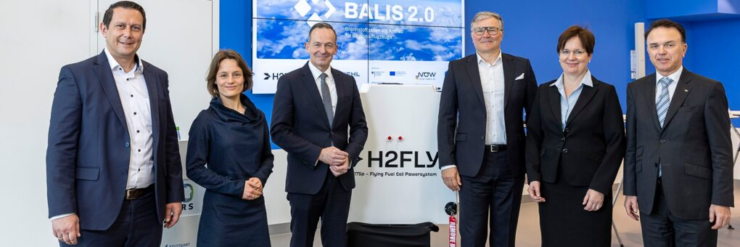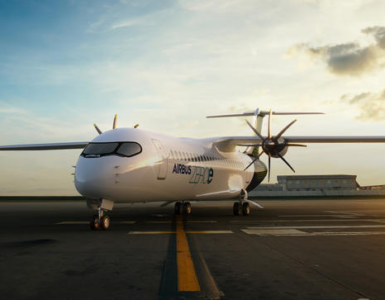Emission-free Aviation – German Federal Ministry For Digital And Transport Funds Project To Further Develop Hydrogen Fuel Cell Technology.
H2FLY, alongside its partners, is set to develop and test a powerful 350 kW fuel cell system, paving the way for zero-emission regional air travel. The German Federal Ministry of Digitalisation and Transport is funding the initiative with grants of around EUR 9.3 million. The fuel cell system is set to be tested on the ground for the first time in 2025.
The Federal Ministry for Digital and Transport (BMDV) today announced the launch of the BALIS 2.0 Project. Dr Volker Wissing, Federal Minister for Digital and Transport, awarded the funding document for the further development of fuel cell systems for regional aircraft to the consortium during the project kick-off at Stuttgart Airport.
The BALIS 2.0 Project, led by H2FLY and supported by the German Aerospace Center (DLR) and Diehl Aerospace, aims to develop and test a high-performance fuel cell system with an output of 350 kW designed for commercial aircraft applications. The 350 kW fuel cell system serves as a basic module to develop hydrogen-electric powertrain systems in the MW-class range, which could power regional aircraft with 40 – 80 seats in the future, emission-free.
🔥 What about we co-host a webinar? Let's educate, captivate, and convert the hydrogen economy!
Hydrogen Central is the global go-to online magazine for the hydrogen economy, we can help you host impactful webinars that become a global reference on your topic and are an evergreen source of leads. Click here to request more details
H2FLY is responsible for the development and setup of the fuel cell system. In the BALIS test field, the German Aerospace Center (DLR) studies the coupling behaviour of fuel cell systems in the megawatt-class range with an electric drive and performs studies to optimise the overall system operation. Diehl Aerospace will continue to develop its high-performance and highly reliable platform technology to enable efficient coupling and scaling of fuel cell systems.
From 2024 to 2026, the BALIS 2.0 project will receive EUR 9.3 million in funding from the BMDV. Funding for this initiative is also provided as part of the German Recovery and Resilience Plan (DARP) via the European Recovery and Resilience Facilities (ARF) in the NextGenerationEU program. The funding guideline is coordinated by NOW GmbH and implemented by Project Management Jülich (PtJ). From the initial project proposal to the completion, PtJ supports all project partners ensuring that the program objectives are successfully achieved.
Dr Volker Wissing, Federal Minister for Digital and Transport says:
I am very proud that Germany is playing a pioneering role in developing hydrogen fuel cell systems for commercial aviation.
“This creates the technical foundation for marketable solutions for tomorrow’s CO2-neutral flying. Companies and research institutions, like those in the BALIS 2.0 project consortium, are leading the way with great expertise and a pioneering spirit.
The defossilisation of aviation is an immense global challenge. Hydrogen offers great potential to significantly contribute to achieving climate targets and realising CO2-neutral global travel and freight transport in the future.”
Korinna Jörling, Head of the Hydrogen, Alternative Fuels and Fuel Cells Division, NOW GmbH:
BALIS 2.0 represents a significant milestone for a sustainable future in aviation.
“Developing and implementing hydrogen technology in aviation isn’t just a major step forward, it’s also a critical response to the urgent challenges of climate change. Investment and innovation in this area underscore the vital role of public funding for pioneering technologies and their transformative impact on the aviation industry.”
Dr Stephanie Bauer, Head of PtJ:
The German government is actively driving the transformation of the transport sector through various research and innovation programs.
“A key example is the National Innovation Program for Hydrogen and Fuel Cell Technology spearheaded by the BMDV. Project Management Jülich plays a crucial role within this program, specifically focusing on advancing aviation technologies and shaping the future of mobility. The BALIS 2.0 project stands out not only for its groundbreaking advancements but also for its consortium leadership by the innovative start-up H2FLY.”
Prof Dr Josef Kallo, co-founder and CEO of H2FLY:
Federal funding for BALIS 2.0 demonstrates the growing significance of hydrogen fuel cell systems as a viable solution for clean aviation.
“The project insights will propel the development of megawatt-class powertrains, significantly accelerating the transition to sustainable, zero-emission flight.”
Prof Dr André Thess, Head of the DLR Institute of Engineering Thermodynamics:
DLR’s vision is emission-free mobility. With the BALIS 2.0 project, we are achieving another important milestone towards deploying new technologies on the path to sustainable mobility.
“Our research infrastructure allows us to test megawatt-class systems, taking us a step closer to achieving DLR’s vision.”
Florian Maier, President & CEO Diehl Aerospace GmbH:
Our contribution to the BALIS 2.0 project underlines the important role of the equipment industry in the development of innovative and eco-efficient aircraft systems and propulsion technologies.
“We are proud to be able to support such an important research project for a more sustainable aviation with our experience and technology.”
DLR’s BALIS test field in Empfingen, Germany was built as part of the previous BALIS project and will go into operation in 2024. Initial ground tests of the 350 kW fuel cell system are planned for 2025.
READ the latest news shaping the hydrogen market at Hydrogen Central
Emission-free Aviation – German Federal Ministry For Digital And Transport Funds Project To Further Develop Hydrogen Fuel Cell Technology. source








